What is an Electrical Emergency?
The types of electrical emergencies we deal with
As Emergency Electricians we deal with a broad range of electrical faults and problems. They range from sudden loss of power to homes or businesses, to situations where there is a risk of electrocution or fires. These are emergency situations that require experienced professionals with the right set of safety credentials.
Since many people are not aware of the dangers or types of electrical emergencies that can arise, we’ve included an overview of some of the instances we have dealt with. If you’re experiencing any of the issues below contact us immediately. We’re available across the Devon, aim to get to call outs within the hour, are available 24 hours a day, and all work is certified.
Electrical Emergency?
Based in Devon, we aim to respond within the hour, 24/7. Trust Heritage Emergency Electrician to restore power to your home or business.
It’s estimated that two-thirds of UK residents have experienced a power cut in their local area. If you experience a power cut to your home or business the first step is to check whether it’s just your premises or affecting other people in your area. While a local power outage will be reported and fixed by either your local utilities company or National Grid, a loss of power in your home is your responsibility.
Common Causes of Power Cuts
Overloaded Circuits
Plugging too many appliances or devices into a single electrical circuit can overload it, causing a circuit breaker to trip. This is a safety mechanism that cuts off power to prevent electrical fires.
Circuit Breaker Trips
Circuit breakers are designed to protect your home’s electrical system. If there’s a short circuit, ground fault, or overload in a circuit, the breaker will trip, cutting off power to that specific circuit.
Faulty Wiring
Damaged or outdated electrical wiring can pose a fire hazard and may lead to power interruptions. Wiring problems may include frayed or exposed wires, loose connections, or deteriorated insulation.
Electrical Appliances
Malfunctioning or faulty electrical appliances can cause power issues. If an appliance develops a short circuit or other electrical problems, it may trip a circuit breaker or cause power fluctuations.
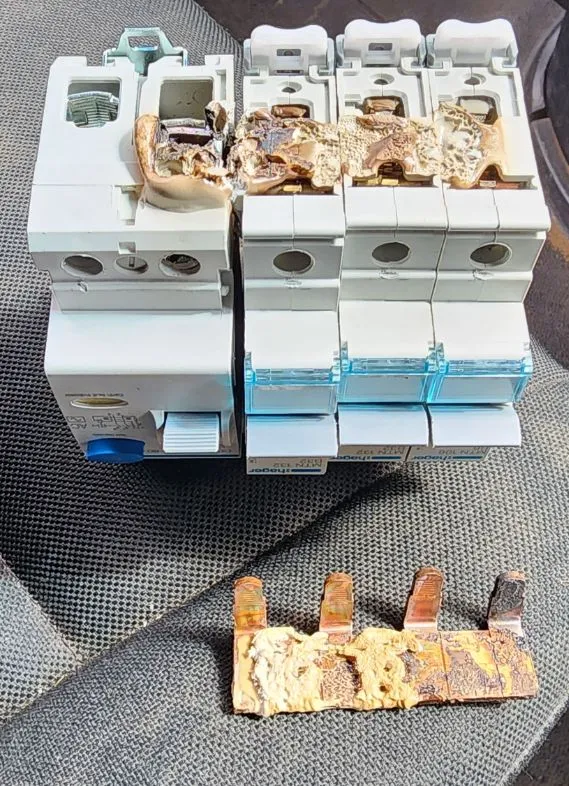
What To Do During A Power Cut
If you experience a power cut in your home, the first step is to check your circuit breaker panel for any tripped breakers and reset them if necessary. If the issue persists a fault within your circuit will need fixing by an emergency electrician. If the issue seems to be a broader outage affecting your local utility provider, you should report the problem to receive updates while they restore power.
Loss of Power or Power Cut
Your fusebox or consumer unit will either have fuses or trip switches. When a fault developes somewhere on the electrical circuit a switch is tripped (by the circuit breaker) and the circuit is broken. Older fuse boards will have fuse holders and when blown they must be replaced or rewired.
Common Problems
With modern consumer units it’s fairly easy to identify the circuit that’s at fault. Before calling an emergency electrician, take a look at which circuit has broken and turn off all switches and appliances on the circuit. Reset the circuit and turn each switch and appliance on until the circuit trips again.
Circuits can break if:
- A circuit is overloaded: too many appliances being used at the same time)
- A faulty appliance: gets too hot, electrical surge or bad wiring)
- Faulty immersion heaters
- Light bulbs blowing: These can sometimes cause tripping
If tripping is not being caused by a faulty appliance it could be a result of these issues:
- Water getting into sockets or switches
- Poor installations of lights, sockets and other accessories
- Faulty heating controls: Pumps or valves
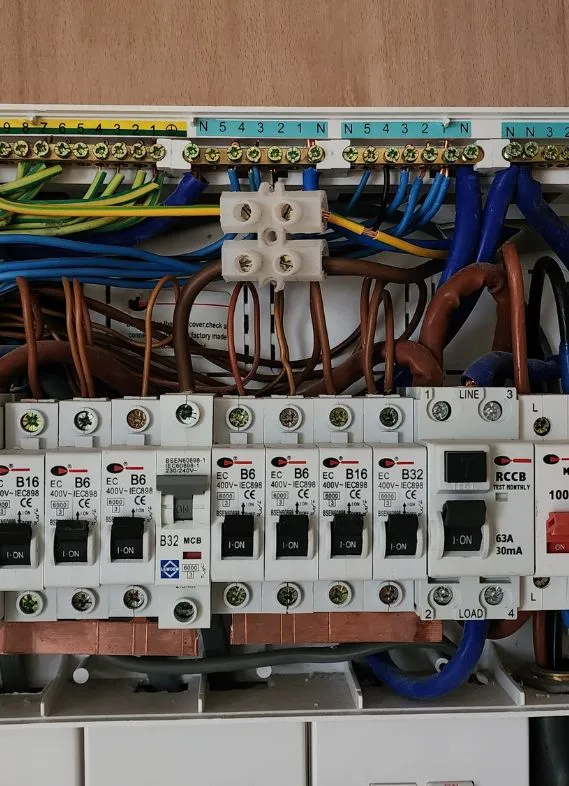
Consumer Unit or Fuse Box Tripping
What To Do If Consumer Unit is Tripping
If you suspect any of the above issues then it’s important to contact a safety registered emergency electrician. For customers with older fuse boards we can discuss the option of installing a more modern replacement that confirms to higher safety standards. Something we strongly advise.
DIYers will often change sockets and switch covers or even add new ones. While it’s tempting to do it yourself, unless you know what you are doing it can cause no end of problems. Faulty electrical sockets and switches are a common cause of electrical problems. If fitted incorrectly they pose a risk of electrical shock and even fires.
We’ve seen a number of problems caused by faulty electrical sockets, including:
- Burnt out back boxes: caused by a the Live wire in constant contact with the back box
- loosely fitted fronts
- Loose wires: if in contact with a front metallic plate there is a risk of electrocution
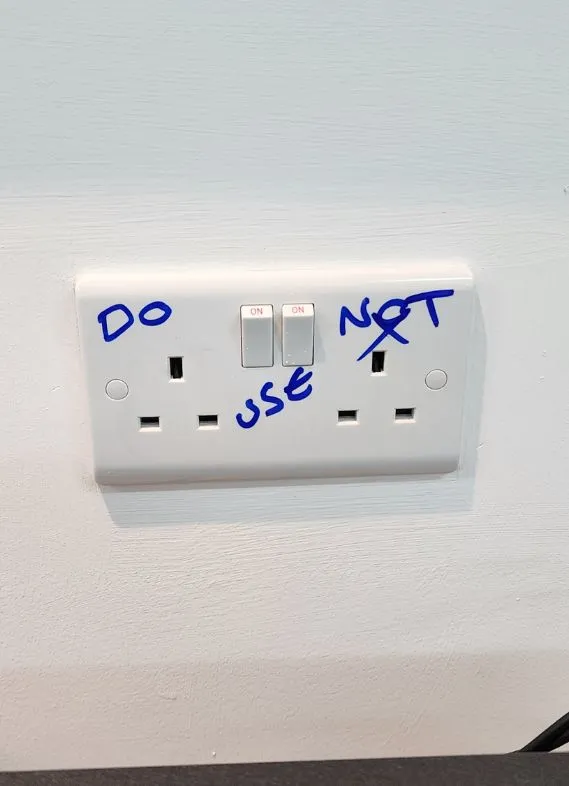
Faulty Wiring & Electrical Sockets
What To Do With Faulty Switches and Sockets
You should check your switches and sockets regularly to ensure they are firmly fixed and free from damage. It you notice sparks, heat or smell burning coming from any of your accessorise then you should contact an emergency electrician right away.
Water is a huge problem for electrics. As a conductor of electricity, when water comes into contact with electrical systems or components, it can create a pathway for electrical current to flow where it shouldn’t. This can provide a variety of electrical hazards and issues including:
Short Circuits
When live electrical components come into contact with water it can cause a short circuit. This can lead to overheating, sparking and potentially electrical fires.
Corrosion
Over time, exposure to water can corrode electrical connections, wires and components. The conductive properties become weakened leading to increased resistance in the electrical system. This can lead to overheating, malfunctions and potentially fires.
Electrical Shock Hazards
Water leaks near electrical outlets, wiring and switches can increase the risk of electrical shock when individuals come into contact with wet surfaces and electrical components.
Ground Faults
Water can create ground faults when it provides a path for electrical current to flow directly to the ground. Ground faults can result in electrical shock hazards and may trip circuit breakers or ground fault circuit interrupters (GFCIs) to prevent further damage.
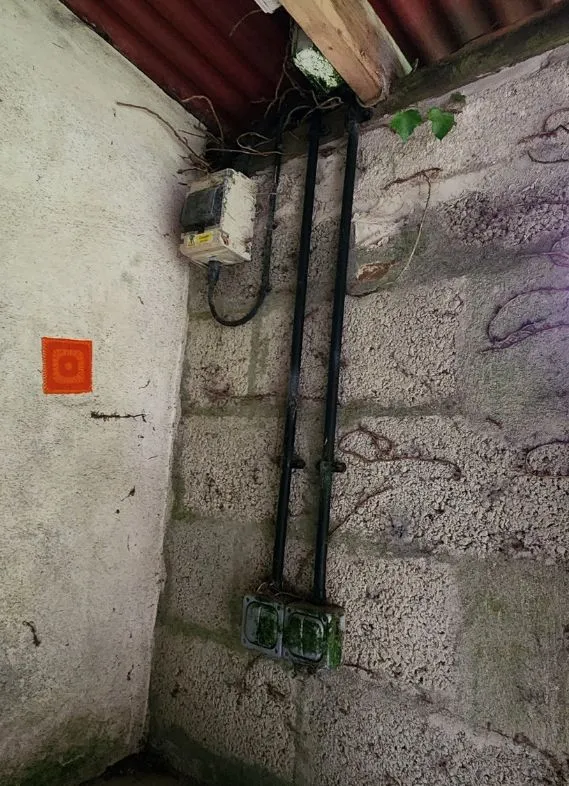
Water Leaks Electrical Emergency
What To Do If Have a Water Leak
To prevent electrical problems caused by water leaks it’s a good idea to inspect your property regularly. If you have damp areas or a visible water leak, take the necessary steps to get this sorted. Inspect your sockets, switches appliances and fuse boards to ensure they are free from moisture and damp. If you’re experiencing problems caused by a water leak or suspect water damage then contact an electrician as soon as possible to prevent future damage or danger.
Outdoor electrical issues present a variety of problems. If electrical components or appliances have been exposed to elements then you could suffer from problems caused by water damage including, corrosion, short circuits, electrical shock hazards and ground faults.
Perhaps you’re experiencing problems other outdoor electrics like electric gates or garage doors. Which could result in not being able to access your property. We’ve experienced a number of problems with automatic opening electronic gates that have malfunctioned as a result of moisture ingress which had sorted some connections. In some instances motors can become badly corroded and require replacement.
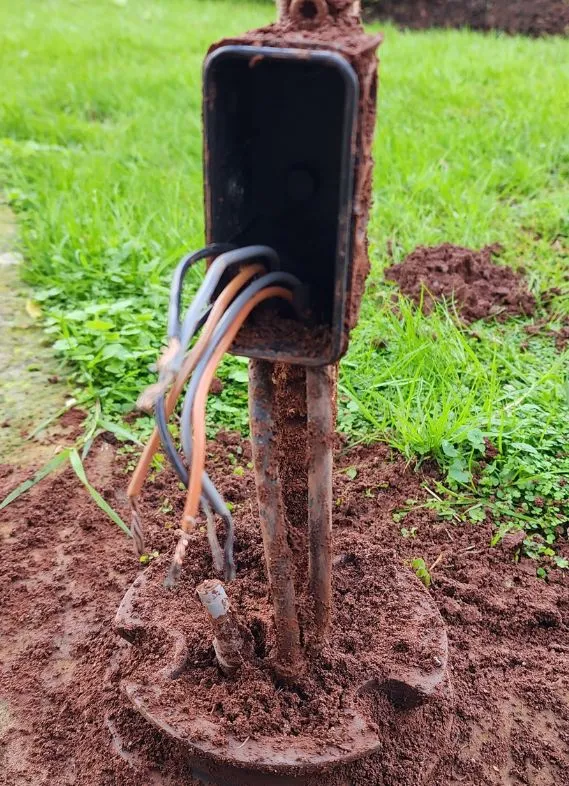
Damage from Pests
Small animals like rodents can nest in electrical enclosures or eat through wires resulting in short circuits and malfunction.
Improper Installation
Electrical Systems that are not installed according to local building codes and safety regulations can be more susceptible to problems. Poor installation practices can lead to issues such as inadequate and improper grounding.
Lightning Strikes
Lightning can cause significant damage to outdoor electrical equipment, including circuit breakers, transformers and power lines.
Tree and Vegetation Interference
Overgrown trees, branches and vegetation can pose a risk to power lines and equipment. We’ve also seem outages and damage to circuits from tree roots over time.
Inadequate protection
Outdoor electrical cords and cables can become damaged or frayed over time. Constant exposure to the elements means these need checking more regularly
Outdoor Electrical Emergencies
What To Do If You Have Outdoor Electrical Issues
It’s a good idea to have your outdoor electronics serviced and inspected regularly to ensure the safe, continued use of your appliances. Don’t wait for them to get so bad that they need emergency care and replacement. However, if you are experiencing issues or suspect any problems then please seek professional help from a certified engineer like Heritage Emergency Electrician. We tend to most areas across the Devon Region within the hour.



